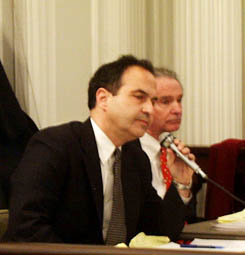A long series of Weehawken Planning Board hearings concerning a proposed $60 million waterfront development continued last week, as experts from Roseland Properties tried to allay concerns from activists about the proposal. Currently, Roseland is seeking approval to build the second phase of its project, Port Imperial South. The first phase, which will include 154 town houses to be built adjacent to the Arcorp Properties offices on Port Imperial Boulevard, received approval from the Planning Board last year and should begin construction shortly. The second phase is more expansive than the first and will add a new office structure, a high-rise apartment complex, and a hotel and shopping center. It also will include a complete renovation of the existing NY Waterway ferry terminal and its parking lot. The most recent hearing featured traffic experts representing Roseland, which was hired by land-owner Arcorp to develop the area. The experts gave testimony, then were cross-examined by the opposition about what the project would mean to the traffic flow in and around Port Imperial Boulevard and the entire waterfront area. In recent weeks, Roseland has produced planning experts, fiscal experts, engineering experts and begun its traffic study presentation. The weekly meetings to review Roseland’s application will continue through March 16, when the last scheduled meeting is expected to take place. However, if all testimony and presentations are not completed by that time, the Planning Board’s review process could be extended – provided it is done within the 120-day allotment set at the time that Roseland officially submitted the building application to the board. Which means one thing. The slow, tedious and meticulous process will continue for quite some time. The Friends of the Weehawken Waterfront, a non-profit activist group, are opposed to the project. They have stated that its enormity would severely alter the existing character of the township. In fact, the group has come up with an alternative plan, with points that they feel need to be addressed by the developer before the project would be feasible in their eyes. They include lowering building height to protect all views of the Hudson River, not just “view corridors,” maintaining continuous public parks along the entire waterfront, building a road that separates public space from private space, and allowing public access at all points. The FWW plan, designed by architect Craig Whitaker, is not receiving any recognition in these proceedings. Doug Harmon, the president of the FWW, believes that the Planning Board hearings are moving along. “I think they’re proceeding the way we envisioned them,” Harmon said. “The Planning Board is allowing our attorney time to cross-examine their experts, but the applicant has still not come back and changed anything in their initial application. They’re proceeding with making their presentation.” Harmon said that he was very pleased with the efforts of attorney James Segreto, who has painstakingly gone through every ounce of the documents presented, as well as the testimony of the experts. “I would say calling Mr. Segreto’s cross-examination of the experts thorough would be the understatement of the millennium,” Harmon said. “He’s doing such a bang-up job. We couldn’t be more happy.” Harmon said that there were some surprising revelations that transpired over the last two meetings, especially when Segreto learned of a private meeting between two members of the Planning Board, two lawyers representing Roseland, the Planning Board attorney and the fiscal expert before a recent hearing (see sidebar). “We believe what they did was against the law,” said Segreto, citing the Sunshine Law, which states that all hearings in the matter should remain in a public setting. “Any deliberations are supposed to take place in public, not by gathering in a little room. From what I understand, these people not only gave suggestions, but also offered to find them a real estate appraiser. That’s weird stuff.” Segreto is undaunted in his approach. “Whether I’m making any leeway with the Planning Board remains to be seen,” Segreto said. “This project is simply going to double the population of Weehawken. The town is going to be inundated with people and cars. Weehawken now has a traffic congestion problem. What will it be like when there are 8,000 more workers and 3,600 more residents? But no one wants to talk about that. So I think business is usual in Alice in Wonderland. We’re going through everything one piece at a time.” Segreto added, “I’m in a reaction position, where they produce some 600 pages of information, then I have to review it and react. Last week, I received a 600-page traffic impact study. My job is to digest those 600 pages, then without getting too much indigestion, try to convince the board to give me enough time for cross-examination. It is a hindrance. They do their thing and I do mine.” Harmon said that he had no idea which way the Planning Board was leaning. “It’s too early to tell,” he said. “For the few things I’ve heard coming from the Planning Board, it seems like they’ve already made up their minds in certain areas. But what else can we do? We can’t give up now. However, all in all, I’m pleased with the way things are going. I’m not pleased with Roseland’s presentation, but I’m pleased with the way things are proceeding.” Roseland Property developer Carl Goldberg had not returned several phone calls by press time, nor had other Roseland representatives.
Our Digital Archive from 2000 – 2016
